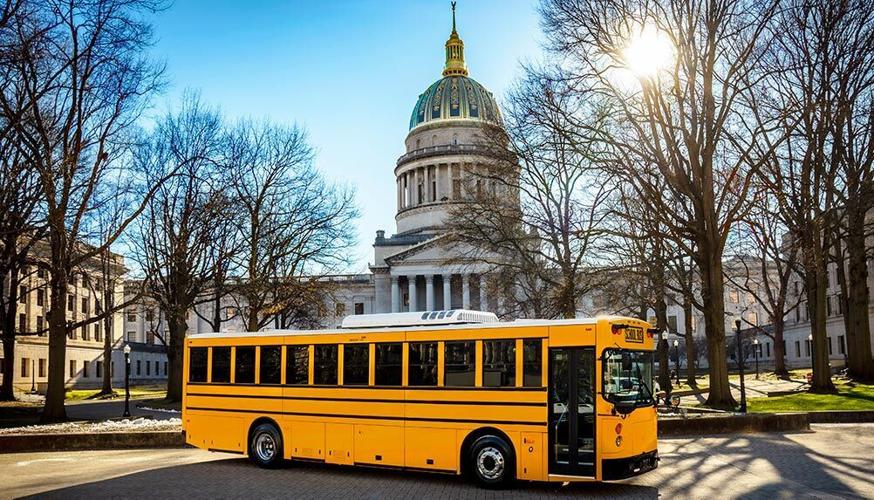
A GreenPower electric school bus sits in front of the West Virginia State Capitol.
CHARLESTON – Three more civil lawsuits have been filed by people who worked at GreenPower Motors’ plant in South Charleston, all accusing the company and officials of sexual discrimination and more.
Glenn Summers, Jennifer Newman and Carlina Jean Thompson filed their complaints October 3 in Kanawha Circuit Court against GreenPower Manufacturing WV Inc. and GreenPower Motor Company. Wendell White, vice president of production, was named as a defendant in all three of the new lawsuits. Mark Nestlen, vice president of business development and strategy who also was over much of the production at the South Charleston facility, is named in two of the three complaints.
Three other women filed similar lawsuits this summer.

Griffith
“This company seems to have groomed and accepted a corporate structure of flagrant sexual discrimination toward women,” attorney Travis Griffith told The West Virginia Record. “Along with the complete disregard for West Virginia Human Rights requirements, GreenPower has also appeared to completely disregard the requirements of the agreement with the State of West Virginia to provide buses and jobs in the Kanawha Valley.”
Thompson was hired in June 2023 as a production team member, according to her complaint. She says she soon was subjected to harassment, bullying, invasions of personal space, intimidation, sexual comments, sexual harassment, ridicule and other forms of harassment by Nestlen. She says he would touch her, scream at her, curse at her and generally intimidate her.
When Thompson was promoted to HES Officer/Facility Manager in March 2024, she says a man in the same position with less responsibility and duties was paid more than here. She also says a floor supervisor told a team leader “if she (Thompson) comes up and talks to you, tell her to f*ck off.”
In the new job, Thompson says she experienced constant harassment, ridicule and hostile behavior from White. That included him telling coworkers not to talk to her, telling her to “get the hell out of here” during meetings and calling her a monster in front of coworkers. She also says Nestlen’s harassment continued.
She says she informed the Human Rights division to no avail, and she did the same to Human Resources at the company’s California headquarters.
Thompson says she was subjected to such extreme conditions that she was forced to resign on September 21, 2024. When she told the company of her decision, she says Nestlen called her a “f*cking bitch.”
She accuses the defendants of sexual discrimination in violation of the West Virginia Human Rights Act, wrongful discharge, constructive discharge, intentional infliction of emotional distress and negligent hiring, retention and supervision.
In Newman’s complaint, she says she was hired in December 2024 as a warehouse inventory clerk. She says she soon was subjected to harassment, bullying, invasions of personal space, intimidation, sexual comments, sexual harassment, ridicule and other forms of harassment by other members of the production team.
After she reported this to Human Resources, she says the HR representative was fired. And she says White began retaliating against her.
“At one point, defendant White locked her out of the facility during a winter nightshift for approximately three hours with no means of leaving the facility during her pregnancy,” Newman’s complaint states.
She lost her child at 20 weeks, and she was given maternity/bereavement pay and told to put in a request for that time off. Despite this request, Newman says she never was paid for this.
Newman says she later was medicated for stress related to the job. She was terminated May 23, 2025.
She also accuses the defendants of sexual discrimination, intentional infliction of emotional distress and negligent hiring, retention and supervision.
In Summers’ complaint, he says he was hired in July 2023 in the warehouse and purchasing department. He says he soon began observing women being subjected to the harassment, bullying, intimidation, sexual harassment, ridicule and more by Nestlen and White.
After he reported this behavior to Human Resources, Summers says he was a victim of retaliation. Starting in August 2023, he says he was required by White to work 16 consecutive weeks, seven days a week.
“Each day begins at 5 a.m.,” Summers’ complaint states. “Plaintiff was not provided any additional compensation for the excessive hours, nor was he provided additional leave to offset the 16 weeks.”
Summers says he was subjected to a drug test by White after he helped a supervisor after the supervisor got the tires on his forklift stuck in mud.
“In early June of 2024, staff inquired as to whether GreenPower would be observing the federal holiday of Juneteenth to plaintiff,” Summers’ complaint states. “Wendell White made the statement about how ridiculous the Juneteenth holiday is and also made racist remarks stating that ‘those people just want to eat fried chicken.’”
Summers oversaw unloading of materials. In late summer 2024, he says a delivery was made. Summers oversaw unloading of materials. This container was expected to have a removable roof for unloading, but it didn’t. Summers refused to allow employees unload the materials because of possible safety issues.
He says White fired him on August 21, 2024, claiming it was for failure to follow a direction to unload the enclosed container. But Summers says that reason was pretextual for his continued refusal to aid and abet the sexual discrimination at the facility.
Summers also accuses the defendants of sexual discrimination, intentional infliction of emotional distress and negligent hiring, retention and supervision.
All three plaintiffs seek joint and several compensatory damages, general damages, special damages, punitive damages, pre- and post-judgment interests, court costs, attorney fees and other relief.
Like the other three women, these three plaintiffs are being represented by Griffith with Griffith Law Center in Charleston.
GreenPower is a manufacturer of electric school buses. When the company announced its move to West Virginia in 2022, it said it would bring up to 200 new jobs by the end of the year and as many as 900 by 2024. At the end of 2024, there were 89 employees at the facility, and more than a dozen of those were laid off in May.
Also, GreenPower and the state had an agreement for up to $15 million for the company to deliver 41 buses for use across the state. Only a dozen of those buses were delivered. And, another agreement had the company to deliver 50 electric buses to seven county school systems through an $18.5 million order through the U.S. Environmental Protection Agency’s Clean School Bus Program. Only a handful of those buses were delivered.
In addition, the company was to acquire 9.5 acres and a building in South Charleston. That lease required no cash up front, and monthly lease payments were to start nine months after production began. In May, the state issued GreenPower a final notice of default for missing lease payments.
“This company came to West Virginia and made deals with the state for jobs and entered into an agreement with the state,” Griffith previously told The Record. “They have not delivered on the buses they were to provide, and they haven’t hired the people they were supposed to hire.”
Kanawha Circuit Court case numbers 25-C-1166 (Summers), 25-C-1167 (Newman) and 25-C-1170 (Thompson)








